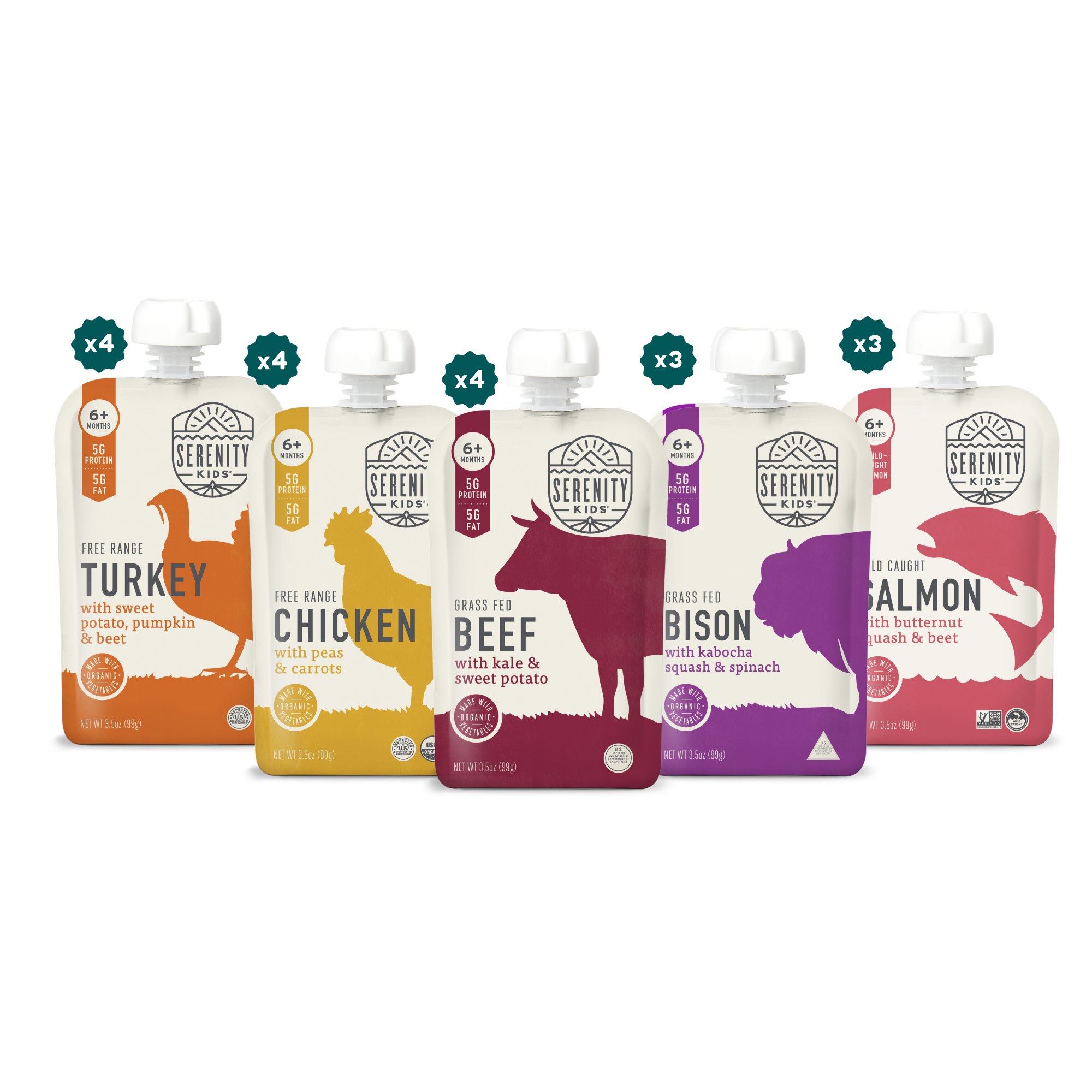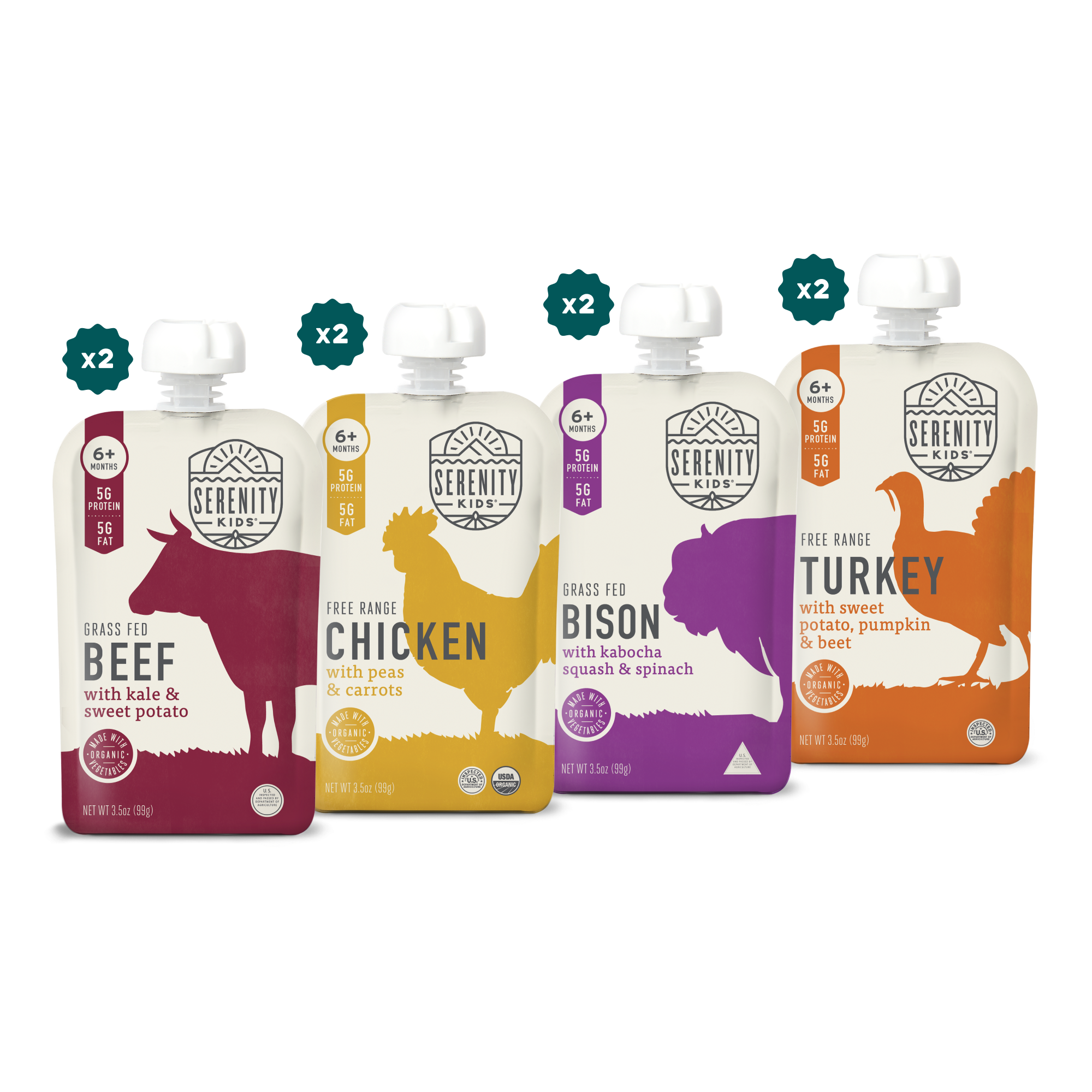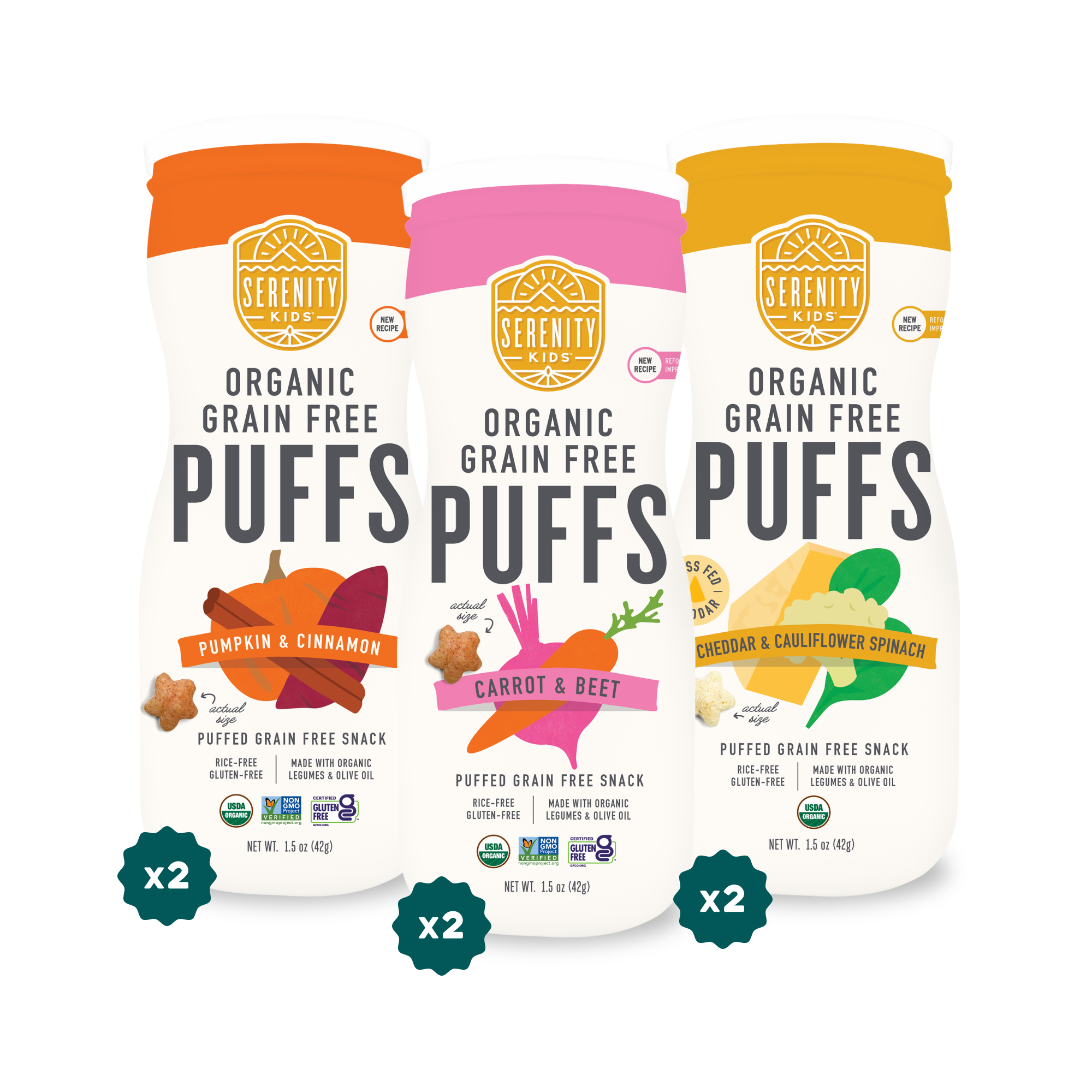TABLE OF CONTENTS
Written by Hillary Bennetts
April 14, 2023
Collagen For Kids. The Ultimate Guide to Its Benefits, Safety, and Tips

Collagen is a buzzy ingredient in the wellness world right now. But does it live up to the hype?
This article digs deep into all things collagen. What is collagen anyway? What is the best source? What should you look for? And what benefits does it have for little ones?
Collagen, Explained
Collagen is a structural protein found in the connective tissue, skin, and bones of animals.
1. What does collagen do in the body?
Like all proteins we eat, collagen is made up of a combination of building blocks called amino acids that have important health benefits.
2. Types of collagen
Collagen is generally categorized into five main types. Serenity Kids uses a mix of Type I and Type III collagen. Type I collagen makes up 90% of your body’s collagen. Type III collagen is found in muscles, arteries, and organs. We chose this blend to support the health and structure of skin, bones, muscles, tendons, ligaments, blood vessels, and organs. Both types are found in the intestines as well, suggesting that they play an important role in gut health.
3. Why quality matters
Like other food, not all collagen is created equal. The quality depends on the health and treatment of the animal they’re derived from, as well as how they’re processed and stored. Just like meat, you can imagine quality varies widely, so we ensure ours is the best.
Serenity Kids uses hydrolyzed, grass fed, bovine collagen sourced from grass fed cows. This collagen is broken down into smaller units of protein (collagen peptides) through a process called hydrolysis, which makes the protein easier to digest and absorb. Studies have shown that grass-fed animal products contain superior nutrition than grain-fed.
All Serenity Kids products and ingredients, including collagen, are evaluated for heavy metal risks. We receive our collagen from suppliers who are carefully vetted to ensure we receive high quality ingredients.
Can Kids Take Collagen?
Many parents wonder whether collagen is safe for kids. While there isn't much scientific research on collagen supplements in children and babies (testing on kids is seldom done, and for good reasons), we know that collagen-rich foods like meats and bone broth are good for babies and children, and that collagen is the most abundant protein in the body. Many parents have found benefits from giving collagen powder to babies and children (we'll discuss those benefits down below).
It's worth noting that we generally avoid most other protein supplements (like protein powders and bars) for little ones. Protein supplements typically include added sugar, artificial sweeteners, and other fillers and additives that you don't want your little one consuming.
How Much Protein Should Your Child Have?
The protein needs of toddlers can vary by age, size, activity level and more. The Dietary Reference Intake (DRI) suggests that 1- to 3-year-olds should get at least 13 grams a day and 4- to 8-year-olds should get at least 19 grams a day. Aim to spread out protein consumption throughout the day rather than serving it all in one sitting. And of course, always consult with a trusted provider for recommendations that meet your child’s unique needs.
Best Food Sources of Collagen
Collagen is found naturally in some foods- primarily in the cartilage, bones, skin, and muscles, of mammals, bovine, poultry, or marine life (think chicken feet and fish skin).
However, rather than eating nose-to-tail like our grandparents and ancestors did, our diets typically consist of boneless skinless chicken breasts and lean cuts of beef. We toss the giblets from the Thanksgiving turkey and cut the skin off of salmon.
Sure, we might get SOME collagen into our diets, but if you look back to the way humans have eaten for the centuries before us, our bodies were meant to thrive on much more.
1. Bone Broth
Collagen is found in bone broth, since bone broth is made by simmering collagen-containing animal parts until the collagen and other nutrients are extracted. It’s no secret that we LOVE bone broth. In fact, you can learn how we make bone broth here, and you can try the most convenient and delicious way to get collagen rich bone broth into your little ones with our bone broth pouches!
Holistic pediatrician Dr. Ana-Maria Temple agrees, “I make weekly bone broth in my crock pot and use it not just for soups, but also to cook rice instead of water and I add it to sauces when the recipe calls for water”
2. Grass Fed Meats
Grass fed beef and other meats on the bone that contain some of the connective tissue contain collagen. They can be tough for little ones to eat, but meat on the bone can be slow cooked and pureed. As Dr. Ana-Maria shares, “Kids who are encouraged to eat with their hands, make a mess, and gnaw on bones end up being more adventurous eaters. Be aware of bones that are too small and pose a choking hazard”
3. Fish (with skin)
Fatty fish is great for a number of reasons (like brain health and development!), but fish with skin on is also a great source of collagen for kids.Of course, with our busy modern day lifestyles, eating nose-to-tail isn’t always practical with little ones (or accepted by them!). So hydrolyzed collagen peptides are a great way to add collagen into our diets.
It's worth noting that collagen is only found in animal foods. However, certain plant-based foods can help to support collagen production within the body. For example, citrus fruits and other fruits and veggies rich in vitamin c help to support collagen production since vitamin c plays a key role in the production of the precursor to collagen. In addition, leafy greens are rich in chlorophyll, which can support collagen production.
Discover the Benefits of Collagen for Kids and Babies
Wondering if collagen is safe for babies and toddlers? Dr. Ana-Maria says, “It isn’t just safe, it's great for their growth!” Collagen has a number of properties that help little ones thrive:
1. May help support normal blood sugar
Because collagen is a rich source of protein, it can help support normal blood sugar by helping kids to feel more satiated. And we all know that less hunger, which can lead to hanger, means fewer meltdowns.
2. May help support gut barrier integrity
Collagen is sometimes referred to as the glue that holds the body together, and this is certainly true in the gut. Collagen is rich in the amino acid proline, which is known to support gut health.
3. May support sleep quality
Not only is collagen rich in protein, which helps sleep, but it’s also rich in the amino acid glycine. Limited research exists in children, but some research suggests that glycine can support sleep quality in adults. It is suspected that glycine has this effect due to its ability to help increase serotonin and lower core body temperature, although these mechanisms have not been confirmed.
4. May support bone health
We know that our bones contain calcium (and we need to consume calcium to keep them strong and healthy). But did you know that bones are actually made primarily of collagen? It’s true! So in addition to calcium, bones need collagen to stay strong and healthy.
Collagen may be supportive of bone health in older children as well. A study in prepubescent children (ages 8-11) suggests that daily dietary intake of hydrolyzed collagen could potentially play a role in enhancing bone remodeling at key stages of growth and development.
5. Supports skin and wound healing processes
One of collagen’s most marketed claims to fame is keeping skin looking young and maintaining its elasticity. Of course, that’s not yet a concern for little ones, but there are healthy skin benefits for them too!
Collagen is rich in the amino acid proline, which helps support wound healing (for all those bumps and bruises!). Proline helps to stimulate cellular migration and contributes to new tissue development. In fact, research has found that during the early phases of wound healing, proline levels in wound fluid are at least 50 percent higher than they are in the blood.
Tips For Introducing Collagen Into Your Kids’ Diet
So maybe you're sold on the benefits of collagen for kids, but you aren't quite sure they'll be up for it? Here are some tips for introducing collagen into your kids' diet.
1. Start with small portions to get your kids used to the taste of collagen-rich foods
When introducing any new food, including collagen-rich foods, start with a small portion and serve it alongside a familiar food. For example, if you're serving salmon with the skin, offer it alongside their favorite side with a tasty sauce so they can dip.
2. Ask them to help you choose and prepare collagen-rich meals
Kids like to be involved in the process, so let them flip through a cookbook or scroll through some recipes to pick ones that look most appealing to them. Then involve them in the shopping and preparation, offering tastes along the way (when safe and appropriate!) to expose them to new foods.
3. Add grass fed collagen protein to hot chocolate, pancakes, muffins, etc.
It's simple to add a little bit of a collagen protein supplement to your little one's favorite foods. Find a collagen supplement that is flavorless so that it doesn't change the taste. Most collagen protein powder has a texture that is easily mixed into just about any liquid, soft food, or baked good, perfect for a picky eater! Have them help scoop it in!
4. Offer them collagen-rich smoothies
Like the other foods, it's simple to add a little bit of a collagen protein supplement to your little one's daily smoothie. Have them help scoop it in. Or try the ready-made dairy-free smoothies from Serenity Kids! Share with them that they have collagen, and they'll learn that collagen can taste delicious!
We’ve got your back
We know how overwhelming it can be as a parent to sift through all of the information out there on food and nutrition for your little ones. It’s why we do what we do, spending thousands of hours on research and taste testing for each and every product we make. From pasture raised regenerative meats to grass fed collagen (and everything in between), we aim to help you feel confident and empowered in feeding your little ones.
As with any new recipe, ingredient or flavor introduction to your little one, consult with a healthcare professional. All content within this site is not intended as medical diagnosis or treatment and should not be considered a substitute for, nor does it replace professional medical advice, diagnosis, or treatment. If you have any concerns or questions, you should always consult with a physician or other healthcare professional.
Medically reviewed by Dr. Ana-Maria Temple. Dr. Temple is a Charlotte, NC based pediatrician specializing in children’s wellness and mother of 3. Her mission is to change kids and families lives through clinical work and education.
You Might Also Like
· 1 min read · Recipes
· 7 min read · Education














































